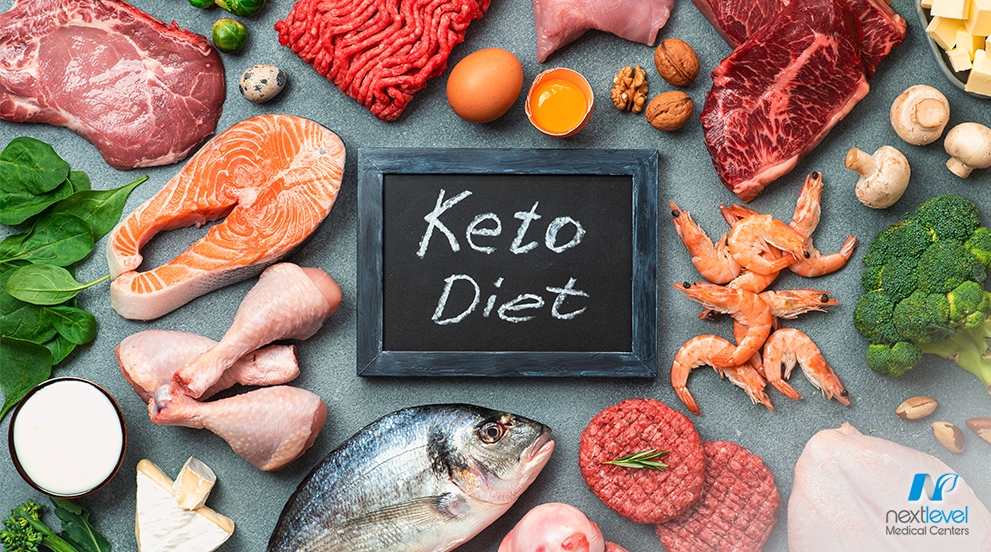There are countless diets and fads currently being lauded by the everyday consumer. However, there is always a little doubt about how effective these diets are in improving our overall health. Some diets are truly beneficial to our health, while others are simply trends that offer minimal effect. This can make it very difficult to figure out which diets are worth pursuing and which can be safely ignored.
Despite the vast number of diets currently circulating in the media, a few have emerged as extremely popular and successful among the average American. One of the most notable success stories is the keto diet, which has become popularized by countless articles and influencers.
However, a successful diet does not necessarily mean you are healthy by following it. Human biology is extremely complicated, and several factors contribute to a healthy body. One important part of maintaining a healthy physical state is detoxing, which allows us to purge the worst things in our bodies.
In response to the information that detoxing is important to physical health, some diets have begun adopting the concept of detoxing into their design. While there are now just as many detox diets as ordinary diets, there remains a question of how the keto diet has been affected. This article will seek to provide insight into whether the keto diet is also an effective detox diet.
What is Detoxing?
The term “detox” is a colloquialism for detoxification, a concept ordinarily reserved for chemical processes designed to remove toxic compounds from certain products. However, in the 1970s, the term “detox” became a popular notion for purging toxins from the human body. The concept has gained a fair amount of traction because we live in an era of fast food and additives that could cause damage to the body if not addressed. While detoxing is an alternative medicine practice, it remains extremely popular with modern holistic medicine enthusiasts. Detox diets work by limiting the type of food or drink we consume.
The goal of a detox diet is to eliminate the consumption of unnecessary ingredients such as flavor enhancers and preservatives. Instead, the diets focus on consuming food with high concentrations of fiber. Fiber is one of the key concepts of a detox diet because it allegedly allows us to shed the toxins stored in body fat. Detox diets claim that introducing fiber-heavy foods increases the fat we burn and that the fat is where most toxins from processed foods and other contaminants are stored. The fiber then allows us to expel these toxins through natural waste processes.

Through detox diets, we are meant to be able to purge the harmful byproducts of a world rife with processed foods. However, some detox diets take things a step further by using diuretics and laxatives to speed up the cleansing process. However, many fail to realize that detox diets will only take you so far since our bodies are naturally equipped to purge toxins without assistance or lifestyle changes. This brings the validity and use of detox diets into question since there might be no genuine cause for them to be used. While it is true that a detox diet does not provide any effects our bodies are not naturally capable of, they might yet have a place.
The body relies on several organs working in concert to expel toxins. When these organs are healthy, we have no trouble doing so and can live our lives without much worry. However, sometimes these organs fall into poor health and need a little assistance. A detox diet can help reoptimize your body for the expulsion of toxins. However, the question of what constitutes a detox diet is another matter, specifically if you are interested in following a keto diet.
What is the Keto Diet?
If you are unfamiliar with modern dietary fascinations, you might not have heard of the keto diet until recently. The keto diet, also known as the ketogenic diet, is a dietary program that focuses on minimizing the intake of carbohydrates in favor of fats. While increasing the number of fats consumed might seem counterintuitive to a program designed to help you lose weight, the keto diet has developed an excellent reputation among many enthusiasts. By dramatically reducing the number of carbohydrates consumed daily and replacing it with fats, your body enters a state known as ketosis.
Ketosis is a bodily state where the concentration of ketones in your system drastically increases. Ketones are a chemical our liver manufactures to compensate for the lack of glucose in your bloodstream. Since carbohydrates are one of the main sources of glucose in humans, decreasing your intake forces your body to compensate by increasing ketone production. However, when we replace the carbohydrate intake with fat, our bodies draw the substitute energy from the fat, which is less taxing than manufacturing ketones from scratch.
When our bodies enter ketosis, we become extremely efficient at burning fat, which has made the keto diet a preferred tool for those seeking to lose weight. However, ketogenic diets are not as cut-and-dry as simply swapping carbohydrates for fats. Multiple versions of the keto diet employ different tactics to achieve the same results.

The main keto diet variations include:
- Standard Ketogenic Diet (SKD): The SKD is the standard low-carb, high-fat diet with an adequate serving of protein. Your average keto diet will consist of 70% fat, 20% protein, and 10% carbs.
- Cyclical Ketogenic Diet (CKD): The CKD is a version of the keto diet that affords you far more carbohydrates than you would get with the SKD variant. You would break down your 7-day week into 5 ketogenic days where you follow the high-fat, low-carb model. After those 5 days, the remaining 2 are high carb refeed days.
- Targeted Ketogenic Diet (TKD): The TKD variant is slightly less structured than the other kinds of ketogenic diets. This is mainly because the TKD model allows you to add supplementary carbohydrates to your daily intake as long as they are consumed within a short period before your workouts.
The differing forms of the keto diet ensure you have some options to pursue its effects in a way that suits your needs. However, the effects of the keto diet are very specific. Keto diets are ideal for weight loss and can help prevent some health conditions associated with obesity because we burn fat more effectively while on the keto diet; reaching your weight loss goals while subscribed to the diet’s restrictions is easier. Unfortunately, we still need to answer the question of how keto diets and detox diets overlap, if at all.
Is the Keto Diet a Detox Diet?
The keto diet might seem like an incredible new method for losing weight, and there is little evidence to contradict that sentiment. However, detox and keto diets might not be as collaborative as you hope. While it is true that the detox diet focuses heavily on burning fat to expel toxins and that the keto diet promotes this fat loss, the two are not connected.
There is little evidence to suggest that a ketogenic diet lends itself to a detox diet in a significant way. Aside from the fact that it is easier to lose weight on a keto diet, the lack of fiber and other “purge” foods make keto diets an ineffective companion to detox.

Fortunately, this is not necessarily a problem. As we mentioned before, the concept of detox diets is not widely accepted since the need for them is minimal. Our bodies are naturally equipped to filter out toxins through organs like the liver or kidney. So long as these organs are healthy, supplementary detoxification is not needed. However, if your kidney, liver, or other filtration organs are compromised, you likely have more pressing issues than your diet.
A keto diet is ultimately worth looking into compared to a detox diet because losing weight is harder than naturally purging toxins from your body. However, you might still be curious about what kinds of food and drinks are meant to be consumed under both dietary lifestyles. Even though the keto diet will likely be more beneficial for your health, knowing what restrictions it imposes can profoundly affect your decision to adhere to its rules.
Food for Detox Diets
When following a detox diet, your main goal is to limit your intake of processed foods and increase your fiber intake. Doing so is meant to limit the number of toxins you introduce to your body while improving the rate of your body’s excretion of existing toxins. However, there are certain foods and drinks you will want to make sure you eat and others you absolutely must avoid.

Food to eat for a detox diet includes:
- Vegetables: As cliché as it sounds, eating your vegetables is immensely important to a detox diet. You will want vegetables known for purging toxins like onions, beets, artichokes, and kale.
- Fruit: Like vegetables, fruits are a staple of detox diets, especially since many are host to antioxidants that help purge toxins from your body. You will mainly want fruits like blueberries, cantaloupe, prunes, tangerines, etc.
- Whole Grains: Whole grains are an excellent source of fiber and carbohydrates, making this the main conflict between detox and keto. Grains like oats, rice, sweet potatoes, buckwheat, and barley are among the best additions to a detox diet.
While consuming these foods benefits a detox diet, countless more foods will harm your detox diet should you pursue it. However, you will want to avoid processed foods like Oreos, Hostess products, fast food, and other “convenient” snacks and meals that are often bogged down by harmful ingredients and products. The keto diet has different restrictions and requirements to ensure the diet works.
Food for Keto Diets
The keto diet is a little more fleshed out than a detox diet and has clear restrictions on what you should eat or drink to ensure the diet affects you. The biggest difference between keto and detox diets is the carbohydrate restrictions that prevent certain grains from being consumed.

A keto diet aims to maximize the beneficial fats and protein you consume. As a result, the basis of your ketogenic diet should consist of:
- Meat: Ketogenic diets focus heavily on meats like steak, sausage, chicken, and ham. Meat has a high concentration of beneficial fats and protein that will help keto take effect.
- Fatty Fish: Fish with a high fat content is another important protein for keto diet followers. Fish like salmon, trout, and tuna are among the best choices for your keto experience.
- Cheese: Dairy is an important part of keto because dairy fat is some of the healthiest available. However, you must avoid processed cheese and focus on freshly made cheddar, mozzarella, or goat cheese.
- Nuts and Seeds: While nuts and seeds can play host to carbohydrates, they are also an excellent source of protein. You will want to focus on almonds, walnuts, flaxseed, and chia seeds for your diet.
There are other considerations for a keto diet, but these foods will serve as the proverbial bread and butter of your experience (with the latter being another approved addition to your diet). Meanwhile, your keto diet should exclude carb-heavy foods like grains, fruits, and low-fat condiments. However, your diet is only a minor detail of your health, and you will need to take steps to ensure that your diet fits with other health considerations. For that, you might need a little more guidance.
Take Your Health to the Next Level!
While a keto diet is not an effective detox diet, it is still an excellent tool for shedding excess weight and reaching your health goals. While your body will usually not need help purging toxins, you might need to put more effort into burning fat if you have subscribed to a sedentary lifestyle in the past. However, outlining a keto diet will only take you so far. To maximize weight loss and achieve your health goals, you might need professional consultation to ensure you follow the right steps.

Fortunately, we at Ortho Integrative can assist you with outlining your health plan. We offer an advanced weight loss program and can help you draw up your keto diet. We can also help outline a rigorous exercise routine to help convert that burned fat into muscle. So, feel free to visit our website if you want to take your health to the Next Level!




